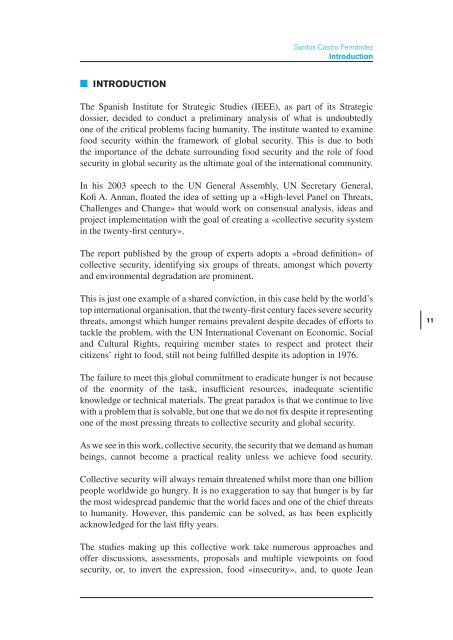Food security and global security - IEEE
Food security and global security - IEEE
Food security and global security - IEEE
- No tags were found...
You also want an ePaper? Increase the reach of your titles
YUMPU automatically turns print PDFs into web optimized ePapers that Google loves.
Santos Castro FernándezIntroduction■■INTRODUCTIONThe Spanish Institute for Strategic Studies (<strong>IEEE</strong>), as part of its Strategicdossier, decided to conduct a preliminary analysis of what is undoubtedlyone of the critical problems facing humanity. The institute wanted to examinefood <strong>security</strong> within the framework of <strong>global</strong> <strong>security</strong>. This is due to boththe importance of the debate surrounding food <strong>security</strong> <strong>and</strong> the role of food<strong>security</strong> in <strong>global</strong> <strong>security</strong> as the ultimate goal of the international community.In his 2003 speech to the UN General Assembly, UN Secretary General,Kofi A. Annan, floated the idea of setting up a «High-level Panel on Threats,Challenges <strong>and</strong> Change» that would work on consensual analysis, ideas <strong>and</strong>project implementation with the goal of creating a «collective <strong>security</strong> systemin the twenty-first century».The report published by the group of experts adopts a «broad definition» ofcollective <strong>security</strong>, identifying six groups of threats, amongst which poverty<strong>and</strong> environmental degradation are prominent.This is just one example of a shared conviction, in this case held by the world’stop international organisation, that the twenty-first century faces severe <strong>security</strong>threats, amongst which hunger remains prevalent despite decades of efforts totackle the problem, with the UN International Covenant on Economic, Social<strong>and</strong> Cultural Rights, requiring member states to respect <strong>and</strong> protect theircitizens’ right to food, still not being fulfilled despite its adoption in 1976.11The failure to meet this <strong>global</strong> commitment to eradicate hunger is not becauseof the enormity of the task, insufficient resources, inadequate scientificknowledge or technical materials. The great paradox is that we continue to livewith a problem that is solvable, but one that we do not fix despite it representingone of the most pressing threats to collective <strong>security</strong> <strong>and</strong> <strong>global</strong> <strong>security</strong>.As we see in this work, collective <strong>security</strong>, the <strong>security</strong> that we dem<strong>and</strong> as humanbeings, cannot become a practical reality unless we achieve food <strong>security</strong>.Collective <strong>security</strong> will always remain threatened whilst more than one billionpeople worldwide go hungry. It is no exaggeration to say that hunger is by farthe most widespread p<strong>and</strong>emic that the world faces <strong>and</strong> one of the chief threatsto humanity. However, this p<strong>and</strong>emic can be solved, as has been explicitlyacknowledged for the last fifty years.The studies making up this collective work take numerous approaches <strong>and</strong>offer discussions, assessments, proposals <strong>and</strong> multiple viewpoints on food<strong>security</strong>, or, to invert the expression, food «in<strong>security</strong>», <strong>and</strong>, to quote Jean
















